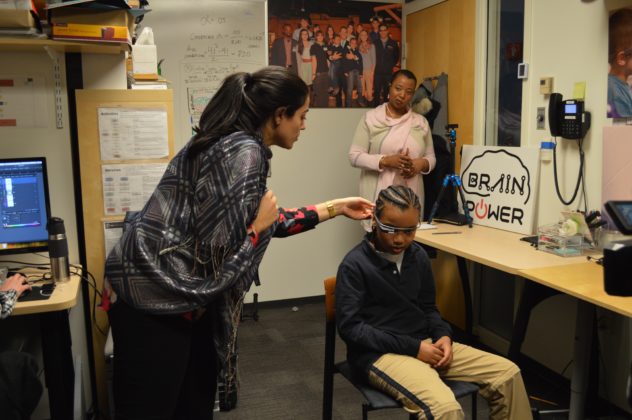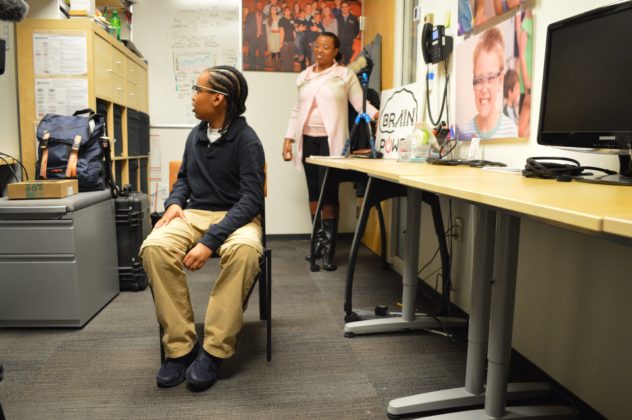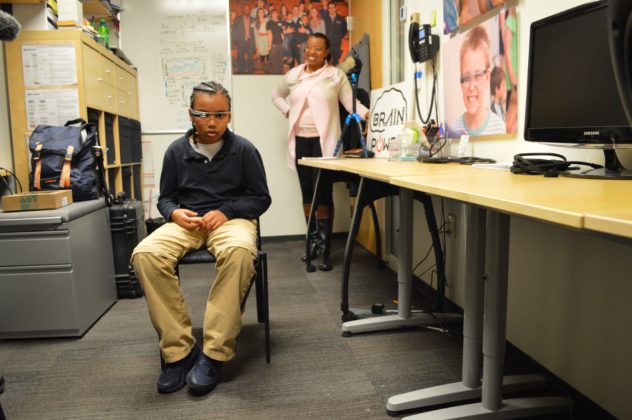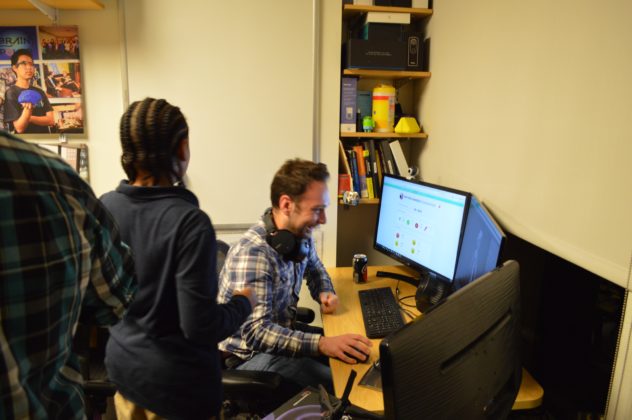This story was written in partnership with NBC Boston, which produced video for this feature.
Sitting a few feet across from his mother in a Cambridge office, Ryan King Jr. looked at his mother’s smiling face and nodded his head to the left.
“How can you make others feel happy?” Zuleka Queen-Postell, Ryan’s mother, said.
“To make you feel so very happy,” the 10-year-old initially responded. His mother pushed Ryan further on the question, looking for a more satisfactory answer. “What can you do to make mommy happy?” Zuleka asked.
“A hug,” Ryan said. Then, with the touch of Zuleka’s smartphone, a gem appeared on a tiny screen in front of Ryan’s right eye. A reward for correctly recognizing a specific emotion and giving an example of what could provoke such a feeling.
This was no ordinary game. Indeed, not many children would normally have access to a $1,500 pair of augmented reality glasses from Google. Instead, this game was meant to help Ryan, who has autism, better understand social interactions and connect with the world.
Local
In-depth news coverage of the Greater Boston Area.
“He definitely understands emotions a lot better than he did three or four years ago,” Zuleka said. “He can read facial expressions now where that was a little challenging for him.”
This game is part of a suite of software from Brain Power, a Cambridge-based startup that is currently raising money for the launch of its Google Glass-based product for children and adults with autism. With four days left on its Indiegogo campaign, the company has far surpassed its $10,000 crowdfunding goal, raising more than $85,000 from over 200 backers.
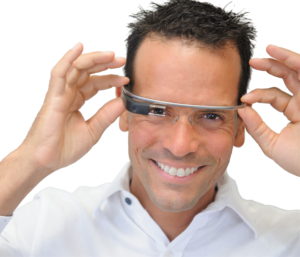
Founded in 2013 by neuroscientist Dr. Ned Sahin, Brain Power draws upon Sahin’s years of research at Harvard University and other schools to build wearable artificial intelligence-based software for people with brain-related challenges. Empower Me, the name of the company’s product suite for people on the autism spectrum, is the company’s first focus.
According to the Mayo Clinic, autism spectrum disorder is “condition related to brain development that impacts how a person perceives and socializes with others.” This results in challenges related to social interaction and communication, which is where Brain Power aims to help and make life easier for people with autism and their families.
“With autism, one of the things is, the person on the spectrum sees the world a little bit differently and the world sees that person a little bit differently,” Sahin said. “When you get that kind of an issue, you have a communication breakdown, so we’re trying to create something that helps translate the world in both directions with a wearable computer.”
Empower Me comes with around 10 games and modules, including the emotion recognition game played by Ryan King Jr. and his mother. There’s also a game that trains players to maintain eye contact with another person by overlaying a cartoon animal’s face on that person. The longer the player maintains eye contact, the more points they get, which eventually comes with new animal faces as rewards. Over time, the cartoon face fades away.
“It uses principles borrowed from video games, not to make it like a typical video game, which you might get addicted to, but in fact to motivate [people],” Sahin said. “Gamification has been shown again and again to actually succeed in getting people to do things that they want to do but sometimes lack the motivation to do it.”
There’s another module that addresses the difficulty people with autism sometimes have with entering new spaces. Before someone enters a space, such as a new classroom, a 360-image is taken of the space, which is then viewable through the AR glasses. The module can also tell if there are certain objects in a space that can create distress.
#td_uid_2_5a97464c4bb21 .td-doubleSlider-2 .td-item1 { background: url(https://www.americaninno.com/wp-content/uploads/2017/12/DSC_0184-1-80x60.jpg) 0 0 no-repeat; } #td_uid_2_5a97464c4bb21 .td-doubleSlider-2 .td-item2 { background: url(https://www.americaninno.com/wp-content/uploads/2017/12/DSC_0205-80x60.jpg) 0 0 no-repeat; } #td_uid_2_5a97464c4bb21 .td-doubleSlider-2 .td-item3 { background: url(https://www.americaninno.com/wp-content/uploads/2017/12/DSC_0203-80x60.jpg) 0 0 no-repeat; } #td_uid_2_5a97464c4bb21 .td-doubleSlider-2 .td-item4 { background: url(https://www.americaninno.com/wp-content/uploads/2017/12/DSC_0177-80x60.jpg) 0 0 no-repeat; }“There was a time when my son couldn’t be in the room with a computer with a black screen,” Zuleka Queen-Postell said of her son Ryan. “If the computer was off we’d have to cover it up or something like that […] so now to have something like this and to really be able to tap into knowing what that one specific thing is, it can be really impactful.”
Empower Me can also help with language development, conversation skills, meltdown prevention and self-confidence. The product suite also comes with a cloud-based web portal that proves ongoing progress reports for each user.
While the list price for Empower Me’s product suite is $2,770, it’s available to pre-order on the Indiegogo campaign for a deep discount, including one option that brings the cost down to $1,110. There is an option for a payment plan, and the company also encourages people to make donations to help those who can’t afford the product. Sahin said Brain Power has been able to subsidize the $1,500 cost of Google Glass thanks to a partnership with X, the name of Google parent company Alphabet’s “moonshot” technology incubator.
Sahin said Empower Me has been tested with about 200 people, including in clinical trials, and the Indiegogo campaign will mark the first time the AR glasses will be available to the public. Sahin said the product has shown to improve and accelerate the rate at which people with autism achieve goals, including ones on their individualized education program, a document created in public schools for children with special education needs.
“You will not generate a design that is universal for your customers if you don’t have people on your team who think differently.”
Brain Power has at least four people with autism working on the team, which Sahin said comes with multiple benefits. For one, it helps the company receive daily input from people who are the targeted end user. It also supports the company’s mission of helping make people with autism self-reliant and self-sufficient.
“There’s nothing that contributes more to that than having a job, so we want to be part of those forward-thinking companies giving people real jobs,” Sahin said.
On a broader level, Sahin said it’s crucial for companies to think about neurodiversity on their teams because the of lack of said diversity can lead to blind spots in product development that could create problems for people with neurological challenges.
“You will not generate a design that is universal for your customers if you don’t have people on your team who think differently,” he said.



